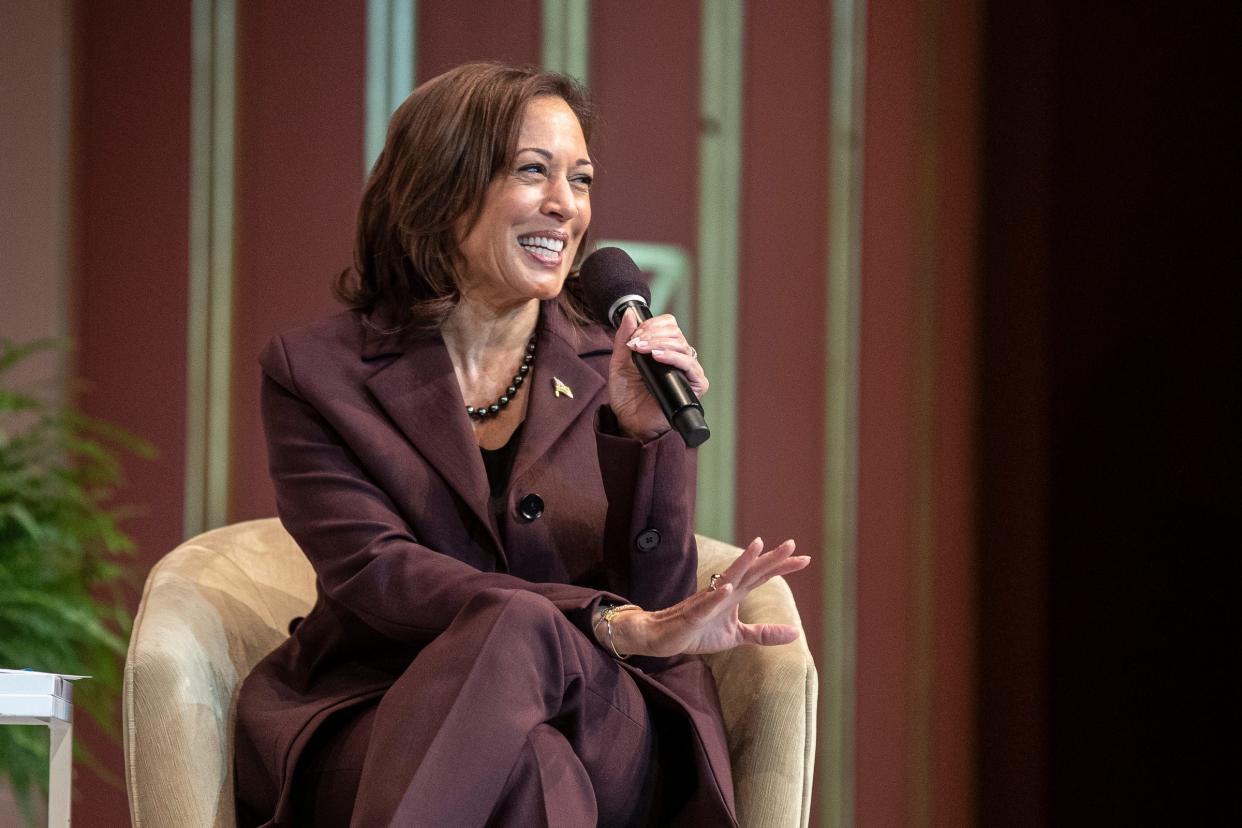Elias: Will California be a demo king- (or queen-) maker?

- Oops!Something went wrong.Please try again later.
- Oops!Something went wrong.Please try again later.
- Oops!Something went wrong.Please try again later.
- Oops!Something went wrong.Please try again later.
President Joe Biden’s bowing to overwhelming pressure from within his own Democratic Party and backing Vice President Kamala Harris to succeed him as president puts California into a position it has not held in more than 50 years: A potential king- or queen-maker.
For more than 50 years, since a June 1972 primary election race between Maine Sen. Edmund Muskie, former Minnesota Sen. Hubert Humphrey and South Dakota Sen. George McGovern, California has been little more than a political moneybag, with candidates from both parties raising vast sums of campaign cash in homes and halls from San Francisco to BelAir, Brentwood, Newport Beach and San Diego.
Not this time. If Harris — who has never overwhelmed voters within her own party or among the general California electorate — does not clinch the nomination on the August Democratic convention’s first ballot, this state could gain immense new influence in picking the next nominee and possible next President.
California will get 494 votes out of 4,223 to be cast on the first ballot at the Chicago convention. On that vote, party leaders and elected officials who are automatic delegates, AKA superdelegates, cannot vote. Still, Californians would cast more than 20 percent of the 2,112 votes needed for a first-ballot win.
Add in the state’s 55 superdelegates, including mayors like Karen Bass of Los Angeles and state officials like Attorney General Rob Bonta, and California has 549 votes on any subsequent ballots, well over one-fifth of what’s needed for nomination.
Which leaves two big questions for the next few weeks: Who might Harris choose for a running mate? And can she muster a clear majority of delegates previously committed to Biden and thus avoid a second ballot?
If Harris does not win on a first ballot, she would almost certainly be toast, with others like Michigan Gov. Gretchen Whitmer, Illinois Gov. J.B. Pritzker, California Gov. Gavin Newsom or Arizona Sen. Mark Kelly then emerging as possible contenders. One of them could be Harris’ running mate, but that will not be Newsom, who hails not merely from the same state as Harris, but the same city. That’s San Francisco, where Harris was district attorney and Newsom the mayor.
A more important question might be this: Among this group, who might have the best chance of beating ex-President Donald Trump and his Republican running mate, Ohio Sen. J.D. Vance?
For sure, a debate or two between Harris and Trump would be very different from the Trump-Biden encounter of June 27, which eventually drove Biden into retirement.
Harris, the former prosecutor, was known for her tough questions in Senate hearings. She would never let Trump escape unscathed with lies like his claim that some Democrat-run states allow babies to be killed just after their birth. That’s murder everywhere.
But the impaired Biden did not respond at all to that claim, nor to Trump’s 30-odd other lies during their debate.
But if Harris did take on a prosecutorial tone, would it appeal to voters?
And how would Newsom, Whitmer, Pritzker or Kelly do running for president? Pritzker is known for his solid performance as governor and the billions of personal dollars he could kick in, while Newsom has gotten both criticism and praise for some of his moves, like quick COVID lockdowns and what amounts to deficit financing of the state budget. He also gets blamed by Republicans whenever businesses leave for lower-tax states like Texas and Florida.
A wild card in some lists of potential candidates is Kelly, husband of Gabby Giffords, herself an assassination target who suffered far more serious damage from her shooting than Trump’s spectacularly bloodied ear. A former astronaut, Kelly also carries some of the celebrity status that helps propel Trump.
But California’s clout will rest on delegation unity. The person most influential in choosing the state’s delegates was Newsom. If he honors his pledge never to oppose Harris, he might be able both to hold the delegation together behind her and her vice presidential pick or to solidify them behind him if Harris drops out after a potential first-ballot failure.
One thing for sure: The more doubt remaining about the Democratic choice as the campaign enters August, the greater California’s influence could be — putting this state in a position many here have long coveted.
Email Thomas Elias at tdelias@aol.com.
This article originally appeared on Ventura County Star: Elias: Will California be a demo king- (or queen-) maker?

